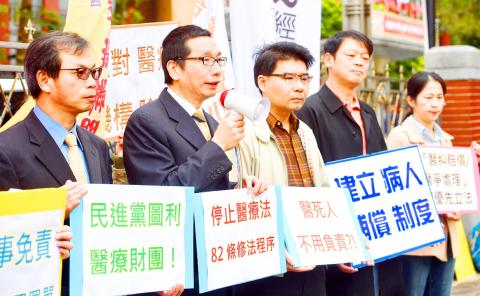In light of increasing lawsuits filed against physicians and the resultant rise in defensive medicine, the Legislative Yuan yesterday approved an amendment to the Medical Act (醫療法) which sets out the conditions for physicians to face criminal charges in medical disputes.
The amendment was made to Article 82 of the act, which formerly stated that “medical facilities and its paramedics should compensate for any harm they cause a patient in the course of performing their duties on the condition that the harm was intentional or a result of negligence.”
The amended article reads: “Paramedics who injure or kill a patient in the course of providing medical treatment due to negligence over items that require attention and nonclinical judgements face criminal liabilities.”

Photo: Peter Lo, Taipei Times
“The two aforementioned violations should be determined after factoring in the branch of medicine practiced, the prevalent medical practice, medical skills, the condition of medical equipment used and work conditions at the time and place of the incident, as well as the urgency of treatment,” it says.
Medical facilities that harm a patient due to negligence should compensate the patient, it stipulates.
Lawmakers across party lines also lent support to two supplementary resolutions, proposed by the Democratic Progressive Party (DPP), that require the Ministry of Health and Welfare to submit a draft bill before Jan. 31 that defines rules governing medical disputes, and to assist the central government in establishing unified reporting and troubleshooting systems for such disputes.
DPP Legislator Lin Ching-yi (林靜儀), who led the legislation, said the amendment was not meant to protect doctors or decriminalize negligence, but to refine the article.
The change would encourage doctors to take risks when attempting to save lives, since it prevents patients or their families who want to receive monetary compensation under the Civil Code from threatening their physician with criminal charges, Lin said.
Citing statistics compiled by the ministry, Chinese Nationalist Party (KMT) Legislator Chen Yi-min (陳宜民) said the number of lawsuits filed against paramedics in 2014 was 3.5 times the number three decades ago: 146 per year between 1987 and 1990, and 534 from 2011 to 2014.
This has discouraged many physicians from taking up high-risk branches of medicine, resulting in a brain drain in these fields, he said.
However, New Power Party Executive Chairman Huang Kuo-chang (黃國昌) said the amendment failed to address the root cause of medical disputes.
He said that while he could relate to the premise, he doubted whether defining circumstances under which doctors face criminal liabilities would help decrease the number of lawsuits against doctors.
Now that legal action by patients is more likely to come in the form of civil lawsuits, compensation could be demanded of doctors like a “contract,” in which a party accuses another of “failing to perform an obligation,” Huang said.
“Whether my predictions will come true, I believe that time will tell,” he added.

POSITIVE DEVELOPMENT: Japan and the US are expected to hold in-depth discussions on Taiwan-related issues during the meeting next month, Japanese sources said The holding of a Japan-US leaders’ meeting ahead of US President Donald Trump’s visit to China is positive news for Taiwan, former Japan-Taiwan Exchange Association representative Hiroyasu Izumi said yesterday. After the Liberal Democratic Party’s landslide victory in Japan’s House of Representatives election, Japanese Prime Minister Sanae Takaichi is scheduled to visit the US next month, where she is to meet with Trump ahead of the US president’s planned visit to China from March 31 to April 2 for a meeting with Chinese President Xi Jinping (習近平). Japan and the US are expected to hold in-depth discussions on Taiwan-related issues during the

‘LIKE-MINDED PARTNER’: Tako van Popta said it would be inappropriate to delay signing the deal with Taiwan because of China, adding he would promote the issue Canadian senators have stressed Taiwan’s importance for international trade and expressed enthusiasm for ensuring the Taiwan-Canada trade cooperation framework agreement is implemented this year. Representative to Canada Harry Tseng (曾厚仁) in an interview with the Central News Agency (CNA) said he was increasingly uneasy about Ottawa’s delays in signing the agreement, especially as Ottawa has warmed toward Beijing. There are “no negotiations left. Not only [is it] initialed, we have three versions of the text ready: English, French and Mandarin,” Tseng said. “That tells you how close we are to the final signature.” Tseng said that he hoped Canadian Prime Minister Mark Carney

President William Lai (賴清德) yesterday bestowed one of Taiwan’s highest honors on Saint Vincent and the Grenadines (SVG) Ambassador Andrea Clare Bowman in recognition of her contributions to bilateral ties. “By conferring the Order of Brilliant Star with Grand Cordon on Ambassador Bowman today, I want to sincerely thank her, on behalf of the Taiwanese people, for her outstanding contribution to deepening diplomatic ties between Taiwan and SVG,” Lai said at a ceremony held at the Presidential Office in Taipei. He noted that Bowman became SVG’s first ambassador to Taiwan in 2019 and

A man walks past elementary school artworks at the Taipei Lantern Festival in Ximen District yesterday, the first day of the event. The festival is to run from 5pm to 10pm through March 15.